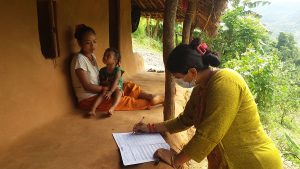For the past year, Avishek has been taking online classes at a well-known school in Kathmandu. For the eight-year-old, the initial days were fun as he enjoyed being able to sit in front of a computer and take classes as his elder sister does. But, as months went by, he stopped enjoying the classes and he started to feel the fatigue of spending so much time in front of the screen. With time, he also found it quite hard to understand what he was being taught and that has been a cause for concern for his parents.
“He’s never been a bright student, but in the past, he hasn’t been this bad,” says his mother. “Maybe it’s time they rethink how online education works when it comes to children.”
The government for a second year has asked schools to remain shut and conduct classes online. They have also been asked to conduct tests online as the SEE candidates will once again be evaluated based on their performance in their internal examinations.
To make sure that children are not deprived of their right to education, the government is introducing a guideline which will help children learn through alternative means like radio, television and online applications. However, psychologists say online education is having a negative impact on children mostly due to being one-sided communication and it is hampering their psychological heath.
The sound of silence

Prem Budhathoki from Jwagal studies in the second standard. His mother Sneha Tamang says she hardly sees the seven-year-old having a conversation which his teachers. After realising this, Tamang started to observe the class to see if it was only her child who did not speak. To her surprise, the entire class was quiet while the teacher taught.
Initially, she felt that it might be a rule not to stop the teachers while they were teaching. But, she has now realised that it is not a rule and feels teachers should encourage students to speak and ask questions they want answers to.
“How can teachers expect seven-year-olds to understand without asking questions? I think schools need to revise how they conduct online classes,” says Tamang.
She says that in the past year, her son has changed a lot. He was active and bubbly as he loved to play outdoors on his bicycle. But lately, all that has changed.
“All he does is sit home and watch TV or is busy on the phone,” says Tamang.
This example proves psychologists right. As children have to sit through seven to eight hours of continuous online classes with breaks of five to 10 minutes between classes, they seem to be fatigued. Not being able to meet their friends in person has also made schooling boring for many as many parents have complained that their child has become lazy.
Effects on psychological heath

Psychologists say they have been getting calls from parents asking them why their child does not want to have conversations with others and does not understand simple things being taught in class. Many parents have even complained about their child being uninterested and lacking focus.
Many schools have asked children to listen to the teacher and only ask questions at the end of the lecture, that too in a written form on apps like Zoom. Even, homework has to be sent online. This, according to psychologist Dr Pushpa Adhikari, is having a negative impact on the child’s mental health.
“They ask students to mute the microphone as it gets too loud, but when it’s only the teacher who speaks, things can get monotonous which in the long can get exhausting,” says Dr Adhikari. “They really need to assess what can be done to curb this burnout in students.”
Another reason why students do not talk to teachers is because they can now record everything that is being taught by the teacher. As they can also screenshot the notes, they feel they no longer need to have a conversation with the teachers. Psychologists say that as it is hard to stare at a screen eight hours a day, concentration lapses are natural as children are bound to be distracted by the smallest of things when uninterested.
What can schools do?

Educationists and psychologists say that schools need to change the way they conduct online classes, adding that the classes need to be made more interesting. Dr Adhikari says that schools need to start a new way to incorporate practical learning.
“They need to come up with a new structure and syllabus,” she says.
She says that children will only learn and have fun doing so if the syllabus is taught in a more creative and interesting manner as the current structure only promotes a mugging-up culture.
“I personally feel that in a 40-minute class, the teacher should teach for 20 minutes and the remaining time should be spent having conversations with the students about their day and what they are struggling with,” says Dr Adhikari.
She also urges teachers to give students more group works or team activities as homework so that their ability to work in a team also gets better.
Child psychologist Madhu Bishal Khanal says that the government has not thought about a child’s mental health when preparing course structures. That coupled with online classes has drastically hampered the mental psyche of children, he says.
“Times have changed and with that, we need to change education practices too. Kids today learn what kids in the 90s learnt despite a lot of things changing. We use technology, but we don’t know how to use it to reform education,” says Khanal.


























